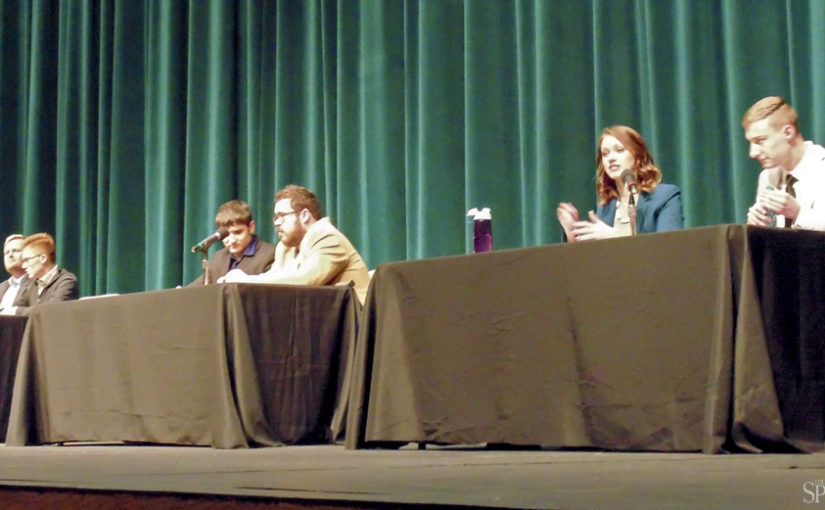An open political forum between Republicans, Democrats and Libertarians took place Wednesday, Nov. 29. The moderator was North Dakota State’s Thomas Ambrosio, professor of political science.
The forum was set up in the format of a five-minute opening platform from each party, followed by a series of questions every party would answer, ending with a question session and a closing statement.
The Republican portion of the panel, Dane Ferguson, executive director of ND GOP, and student Dawson Schefter, the state chairman for North Dakota Young Republicans, aligned their platform with limited government, support for small business and being pro-energy.
Libertarians David Owen, a Libertarian activist, and North Dakota State student Bradley Foster, president for Young Americans for Liberty, laid out their platform as tearing down monopolies and maximizing individual freedoms.
Then Kylie Overson, a current Representative for North Dakota, and William Fleck, president of NDSU College Democrats, programs director for the College Democrats of North Dakota, chair of the College Democrats of America LGBTQ Caucus and chief volunteer officer for the Darcy Jeda Corbitt Foundation, delivered their platform of using government to assure fairness, fighting against monopolies, working to better public education and women’s healthcare and working with people beyond party lines.
There was then a series of questions the parties had to answer within two minutes. The first question was about their beliefs on healthcare.
The Democrats advocated for universal healthcare, saying that it was a right all U.S. citizens deserve, while the Republicans encouraged looking at the Congressional Budget Office for guidance and recommendations on governmental funding. The Libertarians disagreed completely, stating that healthcare is not a right and suggesting free market solutions.
The next question was about the proposed tax code currently being looked at by the House and Senate, and if the parties agreed or if they had any ideas they thought were better.
The Libertarians started that round by expressing their belief in a flat tax, or taxing all people the same percentage based on their income level, and fixing “out of control spending.” The Republicans followed, speaking of reducing tax brackets, simplifying the tax code, bringing money back from overseas and watching the deficit spending. The Democrats emphasized wanting to benefit small businesses through the tax code and stop outsourcing jobs, along with balancing the budget.
The next question on the roster was about the rising costs of education.
The Republicans advocated for ceasing more funding in higher education, and to stop funding the part of universities that don’t directly contribute to the educational side of things. When asked why they think that even though Midwestern universities are at risk because of a lack of funding, the Republicans said that the student body of individual universities should speak up and advocate for where they believe the money universities do receive is allocated. The Democrats strongly disagreed with cutting any funding to universities and actually suggested increasing current funding. The Libertarians proposed making online courses free for qualifying high school juniors and seniors to drive down college costs for students.
When asked what the biggest issue our country in facing, the Democrats believed that it’s simply failing to communicate across party lines. Libertarians stated that the U.S. needs to balance its budget before moving on to other problems. The Republicans proposed fixing the tax codes.
When freedom of speech on campus was brought up, parties mostly agreed that hate speech should be condemned but not legislated, while the Libertarians proposed that those ideas should be present on campus in the form of speakers as a way to learn what students do, and don’t, stand for.
